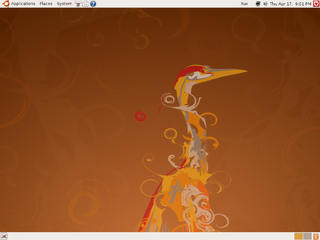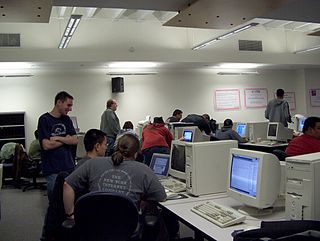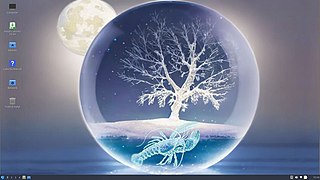
Linux Tour is an ongoing tour of Linux and FOSS related conferences and events held in major Nicaraguan Universities and schools.

Linux Tour is an ongoing tour of Linux and FOSS related conferences and events held in major Nicaraguan Universities and schools.
The first Linux Tour event was held in Managua, Nicaragua, in the Instituto de Estudios Superiores (IES), [1] on June 4, 2007. The first edition of the Linux Tour 2007 had a total of eight events in the cities of Managua and León.
The Linux Tour was initially an initiative of the Nicaraguan Ubuntu LoCo Team. [2] Today, all the major Nicaraguan LUGs are part of the LinuxTour.org organization, which is also responsible for organizing other major events in Nicaragua, such as FLISOL, [3] Document Freedom Day [4] and the Software Freedom Day. [5]
This initiative was recognized by Linux Journal making reference to it in an article. [6]
In February 2009, the Linux Tour went international, with two events scheduled in Tegucigalpa and San Pedro Sula, Honduras. [7] The Nicaraguan Linux Tour events inspired similar initiatives in the region, such as the Ubuntu Tour [8] in Honduras, Café Libre [9] in Guatemala and Pizza Bash, [10] a more informal event, in Nicaragua.

The GNU Project is a free software, mass collaboration project announced by Richard Stallman on September 27, 1983. Its goal is to give computer users freedom and control in their use of their computers and computing devices by collaboratively developing and publishing software that gives everyone the rights to freely run the software, copy and distribute it, study it, and modify it. GNU software grants these rights in its license.

Ubuntu is a Linux distribution based on Debian and composed mostly of free and open-source software. Ubuntu is officially released in multiple editions: Desktop, Server, and Core for Internet of things devices and robots. All of the editions can run on a computer alone, or in a virtual machine. Ubuntu is a popular operating system for cloud computing, with support for OpenStack.
Technical variations of Linux distributions include support for different hardware devices and systems or software package configurations. Organizational differences may be motivated by historical reasons. Other criteria include security, including how quickly security upgrades are available; ease of package management; and number of packages available.

Xubuntu is a Canonical Ltd.–recognized, community-maintained derivative of the Ubuntu operating system. The name Xubuntu is a portmanteau of Xfce and Ubuntu, as it uses the Xfce desktop environment, instead of Ubuntu's customized GNOME desktop.
A Local Community Team, or LoCo Team, is a group of local Linux advocates. The main focus of a LoCo team is to advocate the use of the Linux operating system as well as the use of open source/free software products.

Gobuntu was a short-lived official derivative of the Ubuntu operating system that was conceived to provide a distribution consisting entirely of free software. It was first released in October 2007.

remastersys is a free and open-source program for Debian, Ubuntu-based, Linux Mint or derivative software systems that can:

Ubuntu Netbook Edition (UNE), known as Ubuntu Netbook Remix (UNR) prior to the release of Ubuntu 10.04, is a discontinued version of the Ubuntu operating system (OS) that had been optimized to enable it to work better on netbooks and other devices with small screens or with the Intel Atom CPU.

Ubuntu releases are made semiannually by Canonical Ltd, its developers, using the year and month of the release as a version number. The first Ubuntu release, for example, was Ubuntu 4.10 and was released on 20 October 2004. Consequently, version numbers for future versions are provisional; if the release is delayed until a different month to that planned, the version number will change accordingly.

A Linux User Group or Linux Users' Group (LUG) or GNU/Linux User Group (GLUG) is a private, generally non-profit or not-for-profit organization that provides support and/or education for Linux users, particularly for inexperienced users. The term commonly refers to local groups that meet in person but is also used to refer to online support groups that may have members spread over a very wide area and that do not organize, or are not dependent on, physical meetings. Many LUGs encompass FreeBSD and other free-software / open source Unix-based operating systems.

Lubuntu is a lightweight Linux distribution based on Ubuntu and uses the LXQt desktop environment in place of Ubuntu's GNOME desktop. Lubuntu was originally touted as being "lighter, less resource hungry and more energy-efficient", but now aims to be "a functional yet modular distribution focused on getting out of the way and letting users use their computer".

Linux-libre is a modified version of the Linux kernel that contains no binary blobs, obfuscated code, or code released under proprietary licenses. In the Linux kernel, they are mostly used for proprietary firmware images. While generally redistributable, binary blobs do not give the user the freedom to audit, modify, or, consequently, redistribute their modified versions. The GNU Project keeps Linux-libre in synchronization with the mainline Linux kernel.
Gleducar is a free educational project emerged in Argentina in 2002. It is also an important NGO from Argentina in the field of education and technology.

Bodhi Linux is a light-weight Linux distribution based on Ubuntu that uses an Enlightenment DR17-based fork called Moksha. The philosophy for the distribution is to provide a minimal base system so that users can install the software they want. In turn, the distribution only includes software that is essential to most users, such as a file manager (Thunar), a terminal emulator (Terminology), and a web browser. To install additional software, Bodhi Linux developers maintain a browser-based app store that uses apturl to install programs.

Linspire is a commercial operating system based on Debian and Ubuntu and currently owned by PC/OpenSystems LLC. It had been owned by Linspire. Inc. from 2001 to 2008, and then by Xandros from 2008 to 2017.

Ubuntu Kylin is the official Chinese version of the Ubuntu computer operating system. It is intended for desktop and laptop computers, and has been described as a "loose continuation of the Chinese Kylin OS". In 2013, Canonical Ltd. reached an agreement with the Ministry of Industry and Information Technology to co-create and release an Ubuntu-based operating system with features targeted at the Chinese market.

Emmabuntüs is a Linux distribution derived from Debian and designed to facilitate the restoration of computers donated to humanitarian organizations like the Emmaüs Communities.
The origins of the Free software community in Thiruvananthapuram can be traced back to the group of TeX users around the University of Kerala in early 1980s. The community then later named themselves Thiruvananthapuram LUG, GNU/Linux Users Group, Thiruvananthapuram and then ultimately Free Software Users Group, Thiruvananthapuram. The community has worked with the government in helping with key Free software initiatives in the government and also in promoting and supporting Free software among the general public. The community has also been instrumental in creating an IT policy favorable to Free software in the state of Kerala.

Kerala Infrastructure and Technology for Education (KITE) is a state owned special purpose company under Department of General Education of the Government of Kerala. It was developed to support ICT enabled education for schools in Kerala. The erstwhile IT@School Project was transformed into KITE for extending its scope of operations in August 2017. KITE was the first SPV company to get funded by KIIFB.